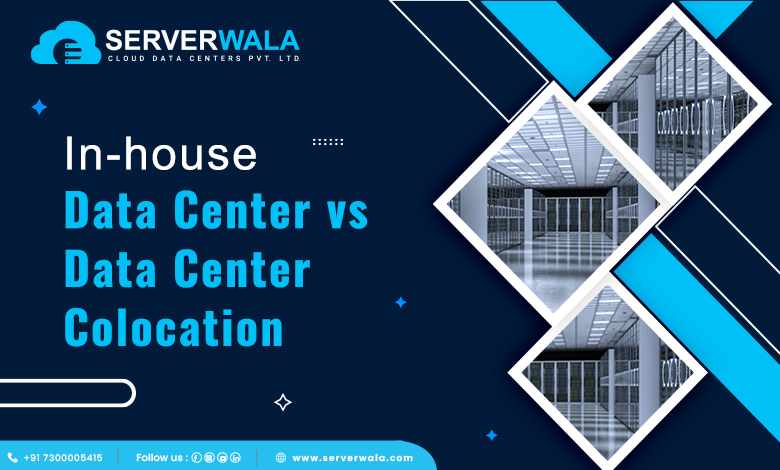How Data Center Colocation Works?

Introduction
In the ever-advancing landscape of IT infrastructure, businesses are constantly seeking efficient and reliable solutions to house their critical data and applications. One such solution gaining popularity is data center colocation. This blog explores the fundamentals of colocation services, shedding light on how this approach revolutionizes the way organizations manage their IT assets.
What is Colocation?

Colocation is more than just a physical space rental; it’s a strategic move that transforms the way businesses manage their IT infrastructure. In the realm of colocation services, organizations house their servers and hardware within a third-party facility – the colo data center. This dynamic approach not only frees businesses from the constraints of traditional in-house data centers but also opens the door to a plethora of advantages.
Within the confines of a colocation hosting environment, companies tap into shared resources, benefiting from the expertise and infrastructure investments of specialized colocation providers. This collaborative setting fosters innovation and efficiency, allowing businesses to focus on their core competencies while offloading the intricacies of IT management.
Moreover, the concept of data center colocation services extends beyond the physical realm. It encapsulates a comprehensive suite of offerings, including advanced connectivity options, disaster recovery solutions, and proactive support services. These additional layers enhance the overall value proposition of choosing colocation as a strategic IT partner.
The decision to embrace data center vs data center colocation is pivotal, with the latter emerging as a robust solution that aligns with modern business demands. As technology advances and business landscapes evolve, colocation stands as a beacon of flexibility, scalability, and cost-effectiveness in the ever-expanding sea of IT solutions. By embracing colocation, organizations position themselves to navigate the complexities of the digital era with agility and resilience.
Benefits of Data Center Colocation

1. Cost Efficiency
Embracing colocation services not only streamlines operations but also brings substantial cost savings to businesses. By forgoing significant upfront investments in infrastructure and maintenance, organizations redirect capital towards core business initiatives. The pay-as-you-go model offered by colocation providers introduces financial flexibility, allowing seamless scalability without the burdens of owning and managing an entire data center. This cost-effective approach optimizes budget utilization, ensuring businesses pay only for the resources they consume, making colocation hosting an attractive option for enterprises, irrespective of their size or scale.
2. Redundancy and Reliability
The unwavering commitment to redundancy and reliability is the cornerstone of colo data centers. Equipped with multiple power sources, cutting-edge cooling systems, and robust security measures, these facilities ensure uninterrupted operations. Meticulous planning in colocation hosting surpasses the reliability levels achievable with traditional in-house data centers. Businesses entrusting their infrastructure to data center colocation services gain enhanced uptime, mitigating risks associated with unforeseen downtime and potential revenue loss, thereby fortifying their position in the competitive landscape.
3. Scalability
The inherent scalability of colocation hosting serves as a strategic advantage for businesses navigating dynamic growth. Unlike in-house data centers constrained by physical space limitations, colocation provides the flexibility to scale up or down seamlessly. This adaptability is particularly crucial for enterprises facing fluctuating workloads or envisioning future expansions. With the ability to adjust resources in real-time, organizations leveraging data center vs data center colocation gain a competitive edge in responding to evolving market demands without the constraints of traditional infrastructure.
4. Security and Compliance
Addressing paramount concerns for businesses, data center colocation services prioritize security. Colocation providers implement advanced security measures, including biometric access controls, state-of-the-art surveillance systems, and cutting-edge fire suppression technologies. Furthermore, many colocation facilities adhere to industry-specific compliance standards, ensuring the highest levels of data integrity and regulatory adherence. By outsourcing infrastructure management to specialized providers, businesses fortify their security posture and ensure compliance with evolving industry regulations, instilling trust among customers and stakeholders alike. This dual focus on security and compliance positions colocation hosting as a holistic solution for the evolving needs of modern enterprises.
In-house data center vs data center colocation

Establishing and maintaining an in-house data center is a complex journey laden with substantial financial investments and ongoing operational expenses. Organizations embarking on this path must allocate resources not only for infrastructure but also for real estate, utilities, and a dedicated staff to manage the facility. While offering complete control over the IT environment, in-house data centers often face challenges in terms of efficiency, scalability, and redundancy.
High upfront costs associated with building and maintaining a proprietary data center pose a significant barrier to entry. Dedicated staff are essential but come with the ongoing challenge of recruitment, training, and retention. The scalability of in-house data centers is inherently limited by physical space constraints, making it challenging to adapt to evolving business requirements. Maintenance becomes a continuous challenge, with organizations needing to stay abreast of technological advancements and manage repairs promptly. The inherent security risks, although addressable, necessitate a considerable investment in robust security measures.
The paradigm shift towards colocation hosting liberates organizations from the intricacies of in-house infrastructure management. By leveraging specialized colocation providers, businesses gain access to state-of-the-art facilities without the burdensome upfront costs associated with establishing their own data centers. The pay-as-you-go model aligns seamlessly with budget constraints, enabling organizations to allocate resources judiciously and scale as needed. Expert personnel provided by colocation facilities bring a wealth of experience to the table, ensuring efficient day-to-day operations.
Within the shared environment of a colo data center, connectivity reaches new heights, fostering collaboration among colocated entities. This collaborative setting promotes synergy, allowing businesses to capitalize on shared resources and facilities. Knowledge exchange becomes organic among businesses sharing the same space, potentially leading to innovative collaborations. The scalability afforded by colocation hosting offers a strategic advantage, allowing organizations to adjust resources seamlessly and respond dynamically to evolving business needs without the constraints faced in traditional in-house data centers.
| In-House Data Center | Data Center Colocation |
| High upfront costs | Cost-effective solutions |
| Dedicated staff required | Expert personnel provided |
| Limited scalability | Seamless scalability |
| Maintenance challenges | State-of-the-art facilities |
| Inherent security risks | Enhanced connectivity |
Also Read: Is Colocation the Right Choice for Your Company?
Conclusion
In conclusion, the choice between data center vs data center colocation boils down to specific business needs and goals. Colocation services offer a compelling alternative, delivering cost savings, enhanced reliability, scalability, and robust security. As technology evolves, businesses must weigh the advantages and drawbacks to determine the most fitting solution for their unique requirements. Colocation emerges as a powerful strategy, empowering organizations to focus on their core competencies while entrusting their IT infrastructure to specialized professionals.





